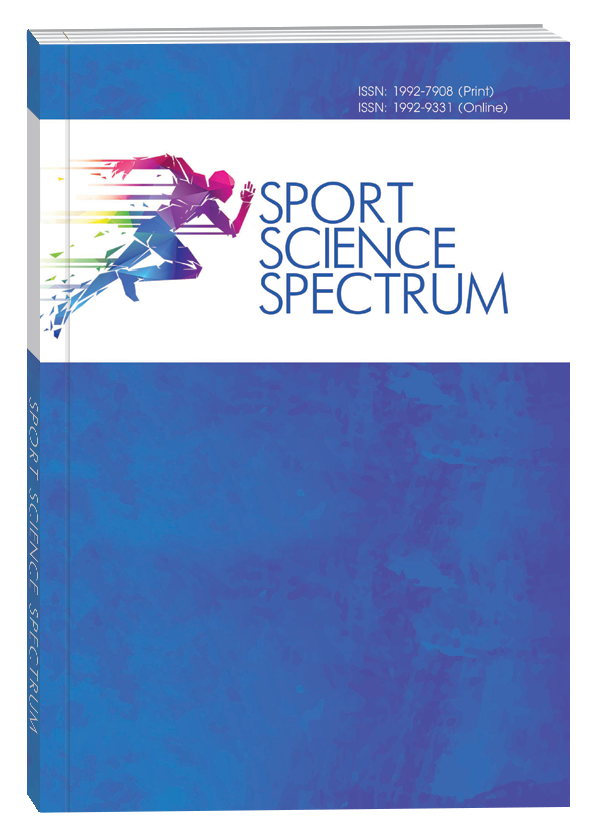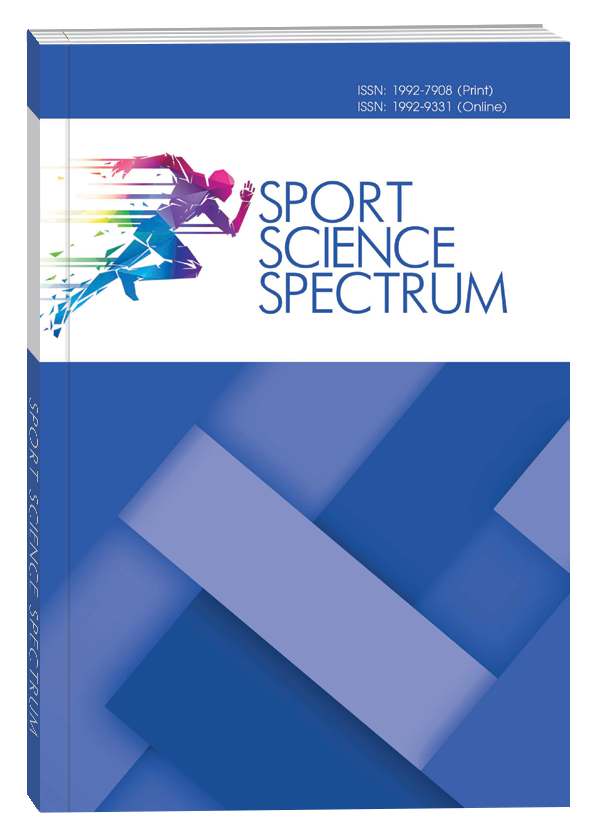FEATURES OF SOCIAL ADAPTATION OF ATHLETES AT DIFFERENT STAGES OF A SPORTS CAREER
DOI:
https://doi.org/10.32782/spectrum/2025-1-11Keywords:
social adaptation, athletes, career stages, psychological support, educational retraining, social integration, adaptation strategiesAbstract
Introduction. The article examines the peculiarities of social adaptation of athletes at different stages of their sports career. The relevance of the topic is due to the importance of adaptation processes for the successful integration of athletes into society, increasing their professional efficiency and ensuring a harmonious transition to new social roles after the end of their sports career. Particular attention is paid to the psychological, socio- cultural and economic aspects of adaptation that affect the quality of their lives. The article establishes that the adaptation of athletes is a multifactorial process that depends on the specifics of each stage of their career. At the initial stages, the key role is played by the support of family and coaches, at the peak of sports activity – by stress and motivation management, and at the end of the career – by the search for new social roles. It is proved that the main obstacles to adaptation are psychological stress, financial instability and isolation from the non-sports social environment. Objective.To determine the peculiarities of social adaptation of athletes at different stages of their sports career and to develop recommendations for creating conditions that promote successful socialization both during and after active sports activities. Methods. The research methods included an analysis of scientific approaches to the study of social adaptation of athletes; synthesis of information and generalisation of data on adaptation strategies at different stages of their careers and their evaluation. Results. The study identified the main adaptation strategies used by athletes and evaluated their effectiveness. It has been found that adaptation programmes that include psychological support, educational retraining and social integration are the most effective in reducing the risks of maladjustment. Practical recommendations are proposed to ensure comprehensive support for athletes at each stage of their career. The conclusions emphasise that for effective social adaptation of athletes, it is necessary to implement interdisciplinary approaches that combine physical, psychological and social training.
References
1. Арнаутова Л., Петровська Т. Копінг-стратегії подолання стресу спортсменами. Теорія і методика фізичного виховання і спорту. 2019. № 2.
С. 105–113. URL: https://doi.org/10.32652/tmfvs.2019.2.105-113 (дата звернення: 19.11.2024).
2. Гант О., Гончаренко В., Мінюй Ч. Особливості соціально-психологічної адаптованості спортсменів 12–14 років в ігрових видах спорту. Спортивні ігри. 2021. № 3 (21). С. 4–13. URL: https://doi.org/10.15391/si.2021-3.01 (дата звернення: 19.11.2024).
3. Корж Н., Захаріна Є., Чередниченко І. Чинники де-соціалізації спортсменів в контексті їх пост-спортивного життя. Olympicus. 2024. № 1.
С. 98–105. URL: https://doi.org/10.24195/olympicus/2024-1.14 (дата звернення: 19.11.2024).
4. Крук М., Одноворченко І., Курилло Т., Цуд І., Іщенко С. Особливості планування багаторічної підготовки у спортивному плаванні. Наукові часописи Університету ім. Драгоманова. Серія: Науково-педагогічні проблеми фізичної культури (фізична культура і спорт). 2023. Вип. 2 (160). С. 124–129.
URL: https://enpuir.npu.edu.ua/handle/123456789/40139 (дата звернення: 19.11.2024).
5. Лаврентьєв О., Крупеня С., Малинський І. Формування моделі професійної підготовки тренера з обраного виду спорту. Науковий часопис НПУ ім. М. П. Драгоманова. 2021. Вип. 5 (136). С. 58–61.
6. Мельников А., Шинкарук В., Кучма А. Побудова ефективної взаємодії між тренером та спортсменом. Olympicus. 2024. № 1. С. 120–124. URL: https://doi.org/10.24195/olympicus/2024-1.17 (дата звернення: 19.11.2024).
7. Олійник Н., Войтенко С. Психологічні особливості спортивної діяльності: монографія. Вінниця: ВНАУ. 2020. 240 с. URL: http://library.megu.edu.ua:8180/jspui/handle/123456789/3734 (дата звернення: 19.11.2024).
8. Онищук Л., Баштовенко О. Інтегрований підхід до управління тренувальною та змагальною діяльністю спортсменів. Перспективи та інновації науки. 2023. № 15 (33). URL: https://doi.org/10.52058/2786-4952-2023-15(33)-400-412 (дата звернення: 19.11.2024).
9. Приймак М., Бігун В., Лазоренко Т. Моделі управління професійним зростанням та кар'єрним розвитком співробітників. Наукові інновації та передові технології. Серія «Управління та адміністрування». 2024. № 2 (30). URL: http://perspectives.pp.ua/index.php/nauka/article/view/9023 DOI: https://doi.org/10.52058/2786-5274-2024-2(30)-498-509 (дата звернення: 19.11.2024).
10. Сергієнко В., Стасюк Р. Прикладні аспекти функціональної підготовки спортсменів. Науковий часопис Українського державного університету імені Михайла Драгоманова. 2024. Вип. 9 (182). С. 214–218.
11. Емоційне вигорання у кваліфікованих спортсменів / С. Тукаєв та ін. Спортивна медицина, фізична терапія та ерготерапія. 2022. № 1. С. 28–32. URL: https://doi.org/10.32652/spmed.2022.1.28-32 (дата звернення: 19.11.2024).
12. Correlation between personality traits of young athletes and their level of self-efficacy / I. Halian et al. Journal of Physical Education and Sport. 2023. Vol. 23, No. 5. URL: https://doi.org/10.7752/jpes.2023.05139 (date of access: 19.11.2024).
13. Hallmann K., Breuer C., Ilgner M., Rossi L. Preparing elite athletes for the career after the career: the functions of mentoring programmes. Sport in Society. 2019. Vol. 23. № 7. P. 1217–1234. URL: https://doi.org/10.1080/17430437.2019.1613375
14. Hamlin M., et al. Monitoring training loads and perceived stress in young elite university athletes. Frontiers in Physiology. 2019. Vol. 10. Article 34. URL: https://doi.org/10.3389/fphys.2019.00034 (date of access: 19.11.2024).
15. Li Y., Yang Y., Yu J. The Influence of Coaches’ Leading Behavior on Young Athletes’ Psychological Pressure and Psychological Adaptation. Revista De Psicología Del Deporte. 2022. Vol. 30. № 4. P. 78–84. URL: http://www.rpd-online.com/index.php/rpd/article/view/585 (date of access: 19.11.2024).
16. Athletes’ Psychological Adaptation to Confinement Due to COVID-19: A Longitudinal Study / V. J. Rubio et al. Frontiers in Psychology. 2021. Vol. 11. URL: https://doi.org/10.3389/fpsyg.2020.613495 (date of access: 19.11.2024).
17. Shutova T., Stolyar K., Vysotskaya T. Socio-psychological problems of highly trained athletes upon completion of sports career. Journal of Physical Education and Sport. 2019. Vol. 19. № 1. P. 652–657. URL: https://www.efsupit.ro/images/stories/April2019/Art94.pdf (date of access: 19.11.2024).
18. Stambulova N. B., Ryba T. V., Henriksen K. Career development and transitions of athletes: The international society of sport psychology position stand revisited. International Journal of Sport and Exercise Psychology. 2021. Vol. 19. № 4. P. 524–550. URL: https://doi.org/10.1080/1612197X.2020.1737836 (date of access: 19.11.2024).
19. Wasserfurth P., Palmowski J., Hahn A., et al. Reasons for and Consequences of Low Energy Availability in Female and Male Athletes: Social Environment, Adaptations, and Prevention. Sports Med – Open. 2020. Vol. 6. 44. URL: https://doi.org/10.1186/s40798-020-00275-6 (date of access: 19.11.2024).
20. Weinberg R., Gould D. Foundations of sport and exercise psychology. Human kinetics. 2023. 739 p.





